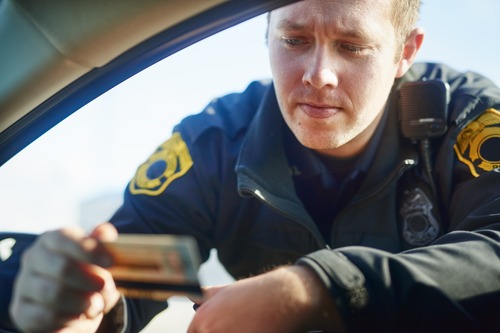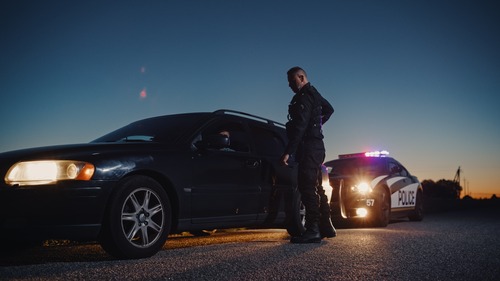At Byron Pugh Legal, we are dedicated to providing skilled and compassionate legal representation throughout Middle Tennessee. Founded by Byron Pugh, a former Nashville prosecutor, our firm brings extensive courtroom experience to every case. We understand the challenges our clients face and are committed to treating each individual with dignity and respect. By developing personalized legal strategies tailored to the unique aspects of each case, we focus on achieving the best possible outcomes for our clients.
A police stop can happen at any time, whether you’re driving to work or walking down the street. Knowing your rights when approached by a law enforcement officer is critical for protecting yourself and avoiding unnecessary legal trouble. Every driver and citizen should understand these basic rules to stay safe and prepared.
In this blog, you’ll learn what your rights are during a police stop in Nashville, how to respond safely and legally, and when to contact an experienced Nashville criminal defense lawyer at Byron Pugh Legal for help.
Before the Police Stop: Setting the Scene
Every police stop begins with a reason. Understanding what can trigger a law enforcement officer to pull over your vehicle is the first step in protecting your rights.
Common Reasons for a Police Stop
An officer can stop a motorist if they observe a traffic violation or driving behavior that creates concern for public safety. Common reasons include speeding, a broken taillight, failure to signal, or expired registration tags. In some cases, the stop may be based on a suspicion that the driver or passenger is connected to a crime.
Reasonable Suspicion Is the Legal Standard
A traffic stop must be based on reasonable suspicion. This means the officer must have specific and clear facts that suggest a law was broken. It cannot be based on a guess or a hunch. The U.S. Supreme Court established this rule in Terry v. Ohio (1968), and Tennessee follows it under established state law and court precedent. Officers must be able to explain why the stop was necessary based on the facts they observed.
During the Stop: How to Respond
How you act during a police stop can affect your safety and any legal case that may follow.
Stay Calm and Keep Hands Visible
Remain calm and keep your hands on the steering wheel where the officer can see them. Avoid sudden movements. If the stop happens at night, turn on your interior light. These actions help reduce the officer’s perception of threat and protect both you and the officer.
Provide Required Documents
Tennessee law requires you to show your driver’s license, vehicle registration, and proof of insurance when requested. Under Tennessee Code Annotated section 55-50-351, drivers must carry and present a valid license. Under section 55-12-139, you must also carry valid proof of financial responsibility.
You Have the Right to Remain Silent
You are not required to answer other questions beyond providing your identification and documents. You have the right to remain silent under the Fifth Amendment. If you choose not to answer questions, say so clearly. Do not lie or give false information, as this can lead to criminal charges.
Do Not Argue or Resist
If you believe the officer is wrong or acting unfairly, stay calm and do not argue. Arguing at the scene can escalate the situation. You can challenge any police misconduct or violations later in court with help from a lawyer.
Vehicle Searches: When Can Police Look Inside Your Car?
Police officers cannot search your vehicle without a legal reason. Understanding when they can and cannot look inside helps protect your rights during a police stop.
Probable Cause Allows a Search
If the officer sees or smells something that suggests a crime, they may have probable cause to search your vehicle. Examples include the odor of drugs, visible weapons, or open containers. Probable cause must be based on facts, not guesses. Officers often claim they believe something illegal is present based on what they observe through a window or smell from the car.
You Can Refuse a Search Without Probable Cause
If the officer does not have probable cause or a warrant, you have the right to refuse a search. You must clearly say that you do not give permission. This refusal helps protect your rights if the case goes to court. Staying calm while refusing is important. Do not physically block the search.
Searches After an Arrest
Police may search your car after arresting you, but only in limited situations. The law allows a search if the officer believes you may access the vehicle or if they expect to find evidence related to the arrest. The U.S. Supreme Court clarified this in Arizona v. Gant (2009). If neither condition applies, the search may not be legal.
Weapons in Vehicles
Tennessee law restricts carrying weapons in motor vehicles under certain conditions. Under Tennessee Code Annotated section 39-17-1319, people with certain criminal records may not legally possess a weapon in a vehicle. If a weapon is in plain view or discovered during a lawful search, it can be used as evidence.
What to Do If You Believe You’re Experiencing Police Misconduct
If you think a law enforcement officer is acting outside the law during a police stop, there are steps you can take to protect yourself and document what happens.
Do Not Argue or Physically Resist
Stay calm. Do not argue with the officer or refuse direct commands, even if you believe your rights are being violated. Arguing or resisting can lead to arrest or harm. Your goal is to stay safe and gather information for later legal action.
Record Key Details
If possible, record the officer’s name, badge number, patrol car number, and the location of the stop. If there are passengers or witnesses, ask them to remember or write down what they saw. If you are recording video, do so without interfering with the officer’s actions.
Ask If You Are Free to Leave
If you are not being detained or arrested, ask if you are free to go. If the officer says yes, leave calmly. If the officer says no, you have the right to know why you are being held.
File a Complaint or Contact a Lawyer
After the stop, you can file a complaint with the officer’s department or contact a lawyer to review the situation. A lawyer can help you take legal steps in court if the officer violated your rights. Keep all records, including any tickets, documents, or videos related to the police stop.
After the Stop: Next Steps
What you do after a police stop can affect your legal outcome. Staying organized and informed helps protect your rights.
If You Received a Ticket
Read the ticket carefully. It will include the alleged violation, court date, and payment instructions. Do not ignore it. Failing to respond can lead to a suspended driver’s license or a warrant for your arrest. You have the right to contest the ticket in court.
If You Were Arrested
If you were taken into custody, contact a lawyer as soon as possible. Do not speak to officers or answer questions without legal counsel. Anything you say may be used as evidence. A lawyer can help you understand the charges and represent you during the court process.
Keep All Records
Save everything related to the stop. This includes the ticket, any court papers, videos, photos, or witness names. These details may help your lawyer build a defense or prove misconduct. If your vehicle was searched or towed, keep all paperwork from the officer or towing company.
Contact Legal Help
An experienced lawyer can review the facts and advise you on your rights. Legal representation is especially important if there are claims of police misconduct, unlawful searches, or criminal charges. A lawyer can help you file a complaint or challenge the stop in court.
Key Takeaways: Know the General Rules, Protect Your Rights
Remembering a few core rules during a police stop can help you stay safe and defend your legal rights later.
You Must Show Certain Documents
You are legally required to show your driver’s license, vehicle registration, and proof of insurance during a traffic stop. Keep these documents in an easy-to-reach place and stay calm while handing them to the officer.
You Do Not Have to Answer Other Questions
You have the right to remain silent. You are not required to answer questions about where you are going, where you have been, or who is in your vehicle. Say clearly that you choose to remain silent. Do not lie.
You Can Refuse a Search
Unless the officer has probable cause or a warrant, you can say no to a search of your vehicle. Clearly state that you do not give permission. Stay polite and calm.
Ask If You Are Free to Leave
If you are not being arrested or detained, you have the right to ask if you are free to go. If the officer says yes, leave without argument. If the officer says no, remain calm and continue to remain silent.
Speak to a Lawyer After the Stop
If you received a ticket, were arrested, or believe your rights were violated, speak with a lawyer. Our firm at Byron Pugh Legal has experienced Nashville criminal defense attorneys who helps drivers, passengers, and citizens protect their rights after police stops.
Protect Your Rights with Help from Byron Pugh Legal!
A police stop can be stressful, confusing, and sometimes unfair. What you do next can affect your freedom, your record, and your future. If you believe your rights were violated, or if you’re facing charges after a traffic stop, it’s important to act quickly. Our team at Byron Pugh Legal has the experience and focus to guide you through the legal process, protect your rights, and hold law enforcement accountable when necessary.
Contact us at 615-255-9595 for a free case consultation today!









